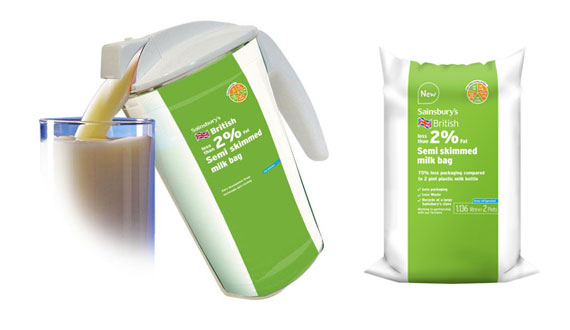
The supermarket chain is looking to educate consumers about the benefits of using the bags, which it hopes will help it to reduce its total packaging by one-third by 2015.
Sainsbury's has offered two-pint plastic bags of semi-skimmed milk in its bigger supermarkets since February. It has claimed that it now sells 120,000 of these per week.
A whole-fat milk bag was launched last week in 100 stores and will be rolled out nationally over the coming months, while skimmed and 1% fat milk variants will reach shelves by June 2011.
Consumers are encouraged to use the bags in conjunction with a reusable 'Jugit' plastic container, 500,000 of which were given away by Sainsbury's during a promotion in April.
A two-pint bag will cost 6p less than the equivalent plastic bottle, and the supermarket claimed the change will help to eliminate up to 14,000 tonnes in packaging waste each year.
To provide all the products in the updated range, Sainsbury's has agreed a deal with supplier Dairy Crest to invest £2.2m in a new processing plant in Gloucestershire.
'This is the biggest change to the nation's shopping habits for at least a decade,' said Emma Metcalf King, senior dairy buyer at Sainsbury's. 'We've been blown away by the positive response. Rather than being wary of new packaging, customers have lapped up the bags.'
However, the retailer may face a challenge in persuading consumers to change their routine, after Waitrose was forced to abandon a similar trial earlier this year, citing 'unacceptable' levels of waste. Waitrose began trialling milk bags in 2007, while Sainsbury's trials began in 2008.
Gwyn Burr, Sainsbury's customer director, recently told Marketing that the milk bags would represent a 'flagship product' for the retailer as well as helping it to raise awareness of its environmental credentials.
Sainsbury's holds regular 'Make the difference day' events in its stores to promote its range of sustainability initiatives to customers.
Top 10 green brands
Rank Brand
1 The Body Shop
2 Innocent
3 Marks & Spencer
4 Sainsbury's
5 Tesco
6 Asda
7 Waitrose
8 Dove
9 Boots
10 IKEA
Source: WPP research in partnership
with Esty Environmental Partners



.jpg)
.jpeg)
